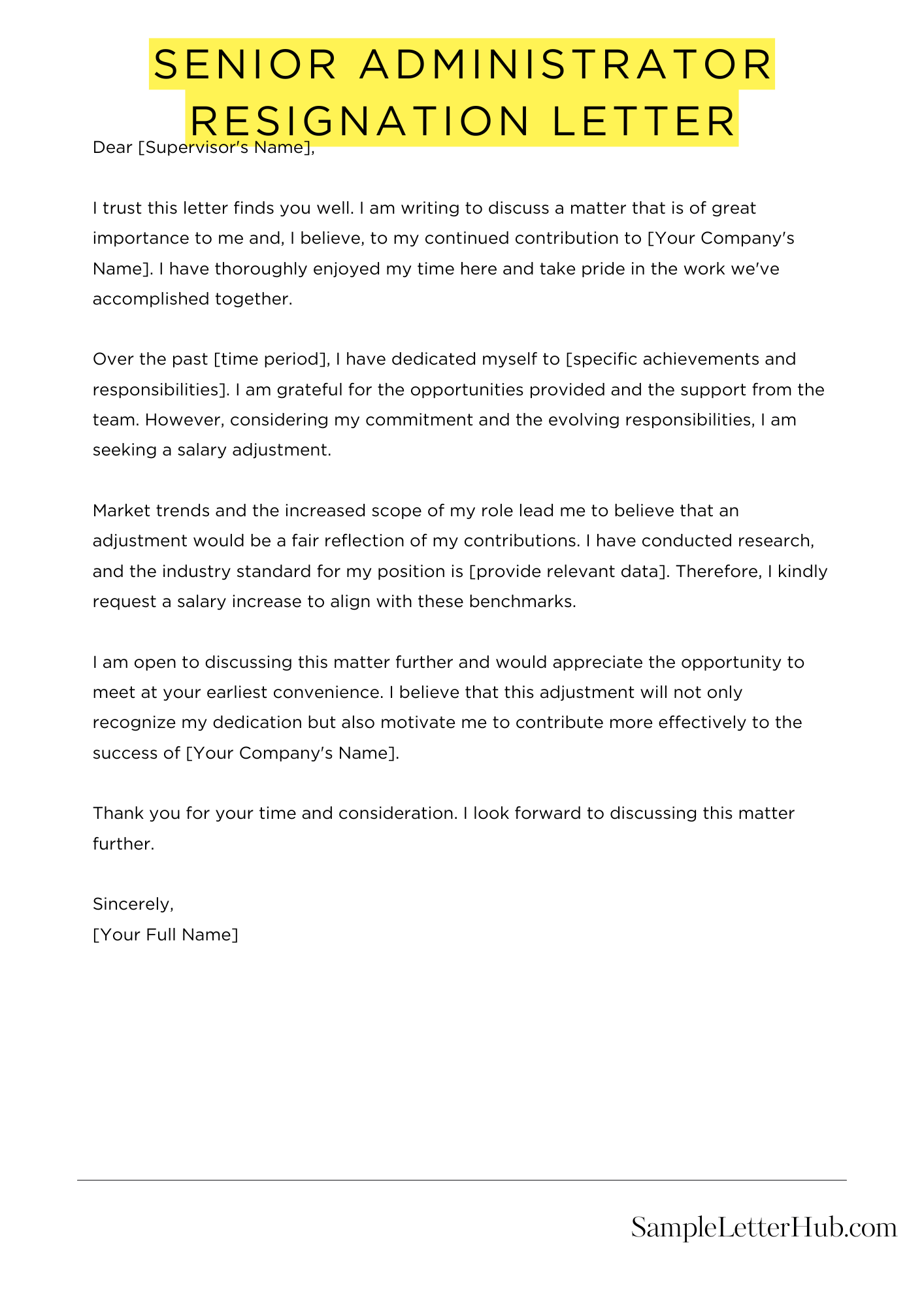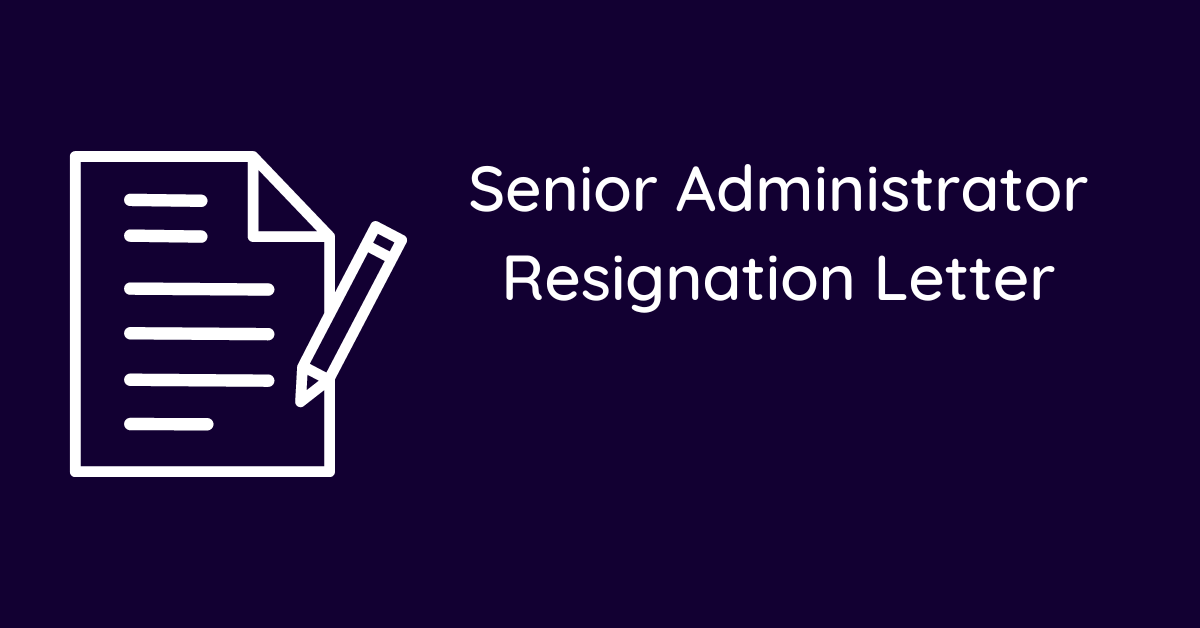Writing a senior administrator resignation letter can be a daunting task, but it’s an important step in leaving your job on a positive note. In this article, we’ll share an example of a senior administrator resignation letter that you can use as inspiration.
When writing your resignation letter, it’s important to be polite and humble. Remember that you’re leaving a job, not a relationship. Be clear and concise in your explanation of why you’re leaving, and be sure to thank your employer for the opportunity to work there.
Below, we’ve included a template for a senior administrator resignation letter that you can use as a starting point. Feel free to adapt it to fit your own circumstances.
Senior Administrator Resignation Letter
Dear [Recipient Name],
Please accept this letter as formal notification that I will be resigning from my position as Senior Administrator with [Company/Organization Name], effective [Last Date of Employment].
I have enjoyed my time at [Company/Organization Name] and am grateful for the opportunities and experiences I have gained during my tenure. I have learned a great deal and have developed both professionally and personally.
I wish you and [Company/Organization Name] all the best in the future.
Sincerely,
[Your Signature]
Short Senior Administrator Resignation Letter Sample
Please accept this letter as formal notification that I am resigning from my position as Senior Administrator at [Company Name]. My last day of employment will be [Your Last Day]. Thank you for the opportunity to grow and learn during my time here. I wish you and the company continued success. I am happy to assist in the transition process to ensure a smooth handover of my responsibilities.
I wish you all the best with your senior administrator resignation letter.
When it’s time to say farewell, expressing your gratitude and best wishes can make the transition smoother:

How to Write a Senior Administrator Resignation Letter
1. Start with a Formal Salutation
Begin your letter with a formal salutation, such as “Dear [Recipient’s Name].” If you don’t know the recipient’s name, you can use “To Whom It May Concern.”
2. State Your Intention to Resign
In the first paragraph, clearly state your intention to resign from your position as Senior Administrator. Be sure to include the date of your last day of employment.
3. Express Your Gratitude
Take a moment to express your gratitude for the opportunity to work at the company. Mention any specific experiences or people that have made your time there meaningful.
4. Offer to Help with the Transition
If you’re able, offer to help with the transition during your notice period. This could include training your replacement or providing documentation on your responsibilities.
5. Close with a Professional Tone
End your letter with a professional tone, such as “Sincerely” or “Best regards.” You can also include your contact information in case the company needs to reach you after you’ve left.
6 Most Frequently Asked Questions About Senior Administrator Resignation Letters
Resigning from a senior administrator position can be a daunting task, but it’s important to do it professionally and respectfully. Here are the six most frequently asked questions about senior administrator resignation letters, along with their answers:
1. What should I include in my resignation letter?
Your resignation letter should include the following information:
- Your name and contact information
- The date
- The name of the person you are resigning to
- Your current position
- Your last date of employment
- A brief statement expressing your gratitude for the opportunity to work at the company
- Your signature
2. How should I format my resignation letter?
Your resignation letter should be formatted in a professional and easy-to-read manner. Use a standard font, such as Times New Roman or Arial, and 12-point font size. Left-align your text and use single line spacing.
3. What should I say in my resignation letter?
In your resignation letter, you should be clear and concise about your decision to leave. You should also express your gratitude for the opportunity to work at the company and wish the company well in the future.
4. When should I submit my resignation letter?
It is generally advisable to submit your resignation letter two weeks before your last date of employment. This will give your employer time to find a replacement.
5. What if I am asked to stay?
If you are asked to stay, it is important to be polite and respectful. You should explain your reasons for leaving and reiterate your decision to resign.
6. What if I am leaving on bad terms?
If you are leaving on bad terms, it is important to remain professional in your resignation letter. You should avoid making any negative comments about the company or your colleagues.
Before making the decision to resign from your job, it’s essential to consider the legal aspects:
Understanding your emotions after quitting your job is important. Explore why you might be feeling sad:
Related
- Resignation letter sample
- Forced resignation letter
- Resignation letter due to going abroad
- Resignation letter due to marriage
- Resignation letter due to other opportunity
- Resignation letter due to mistake

